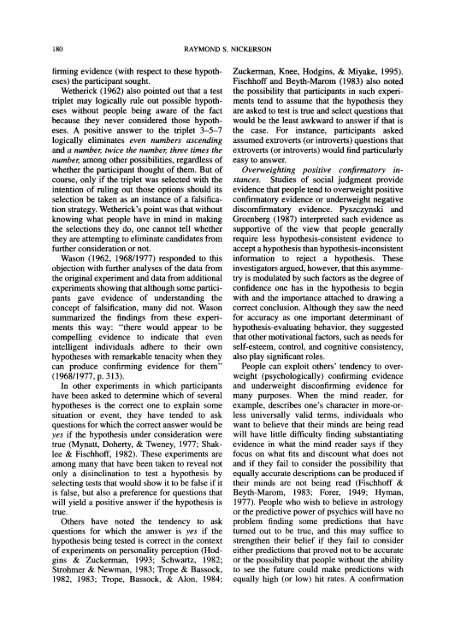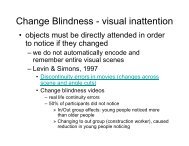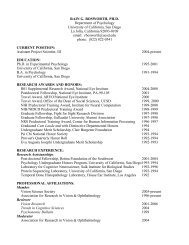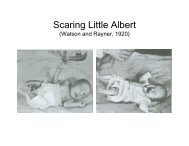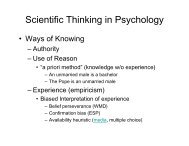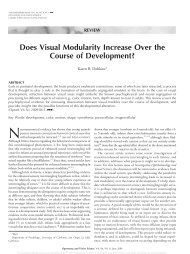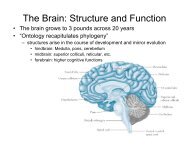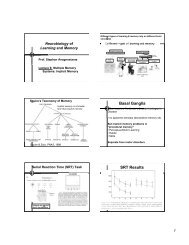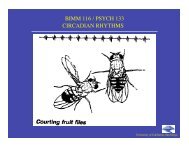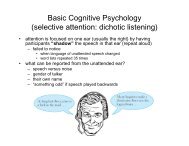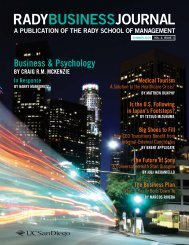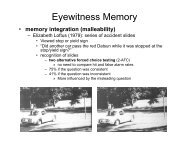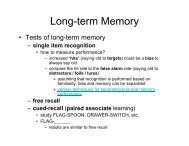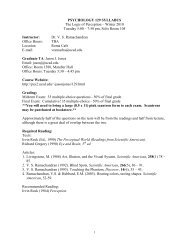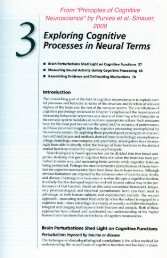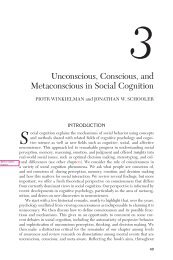Confirmation Bias: A Ubiquitous Phenomenon in Many Guises
Confirmation Bias: A Ubiquitous Phenomenon in Many Guises
Confirmation Bias: A Ubiquitous Phenomenon in Many Guises
You also want an ePaper? Increase the reach of your titles
YUMPU automatically turns print PDFs into web optimized ePapers that Google loves.
180 RAYMOND S. NICKERSON<br />
firm<strong>in</strong>g evidence (with respect to these hypotheses)<br />
the participant sought.<br />
Wetherick (1962) also po<strong>in</strong>ted out that a test<br />
triplet may logically rule out possible hypotheses<br />
without people be<strong>in</strong>g aware of the fact<br />
because they never considered those hypotheses.<br />
A positive answer to the triplet 3-5-7<br />
logically elim<strong>in</strong>ates even numbers ascend<strong>in</strong>g<br />
and a number, twice the number, three times the<br />
number, among other possibilities, regardless of<br />
whether the participant thought of them. But of<br />
course, only if the triplet was selected with the<br />
<strong>in</strong>tention of rul<strong>in</strong>g out those options should its<br />
selection be taken as an <strong>in</strong>stance of a falsification<br />
strategy. Wetherick's po<strong>in</strong>t was that without<br />
know<strong>in</strong>g what people have <strong>in</strong> m<strong>in</strong>d <strong>in</strong> mak<strong>in</strong>g<br />
the selections they do, one cannot tell whether<br />
they are attempt<strong>in</strong>g to elim<strong>in</strong>ate candidates from<br />
further consideration or not.<br />
Wason (1962, 1968/1977) responded to this<br />
objection with further analyses of the data from<br />
the orig<strong>in</strong>al experiment and data from additional<br />
experiments show<strong>in</strong>g that although some participants<br />
gave evidence of understand<strong>in</strong>g the<br />
concept of falsification, many did not. Wason<br />
summarized the f<strong>in</strong>d<strong>in</strong>gs from these experiments<br />
this way: "there would appear to be<br />
compell<strong>in</strong>g evidence to <strong>in</strong>dicate that even<br />
<strong>in</strong>telligent <strong>in</strong>dividuals adhere to their own<br />
hypotheses with remarkable tenacity when they<br />
can produce confirm<strong>in</strong>g evidence for them"<br />
(1968/1977, p. 313).<br />
In other experiments <strong>in</strong> which participants<br />
have been asked to determ<strong>in</strong>e which of several<br />
hypotheses is the correct one to expla<strong>in</strong> some<br />
situation or event, they have tended to ask<br />
questions for which the correct answer would be<br />
yes if the hypothesis under consideration were<br />
true (Mynatt, Doherty, & Tweney, 1977; Shaklee<br />
& Fischhoff, 1982). These experiments are<br />
among many that have been taken to reveal not<br />
only a dis<strong>in</strong>cl<strong>in</strong>ation to test a hypothesis by<br />
select<strong>in</strong>g tests that would show it to be false if it<br />
is false, but also a preference for questions that<br />
will yield a positive answer if the hypothesis is<br />
true.<br />
Others have noted the tendency to ask<br />
questions for which the answer is yes if the<br />
hypothesis be<strong>in</strong>g tested is correct <strong>in</strong> the context<br />
of experiments on personality perception (Hodg<strong>in</strong>s<br />
& Zuckerman, 1993; Schwartz, 1982;<br />
Strohmer & Newman, 1983; Trope & Bassock,<br />
1982, 1983; Trope, Bassock, & Alon, 1984;<br />
Zuckerman, Knee, Hodg<strong>in</strong>s, & Miyake, 1995).<br />
Fischhoff and Beyth-Marom (1983) also noted<br />
the possibility that participants <strong>in</strong> such experiments<br />
tend to assume that the hypothesis they<br />
are asked to test is true and select questions that<br />
would be the least awkward to answer if that is<br />
the case. For <strong>in</strong>stance, participants asked<br />
assumed extroverts (or <strong>in</strong>troverts) questions that<br />
extroverts (or <strong>in</strong>troverts) would f<strong>in</strong>d particularly<br />
easy to answer.<br />
Overweight<strong>in</strong>g positive confirmatory <strong>in</strong>stances.<br />
Studies of social judgment provide<br />
evidence that people tend to overweight positive<br />
confirmatory evidence or underweight negative<br />
discomfirmatory evidence. Pyszczynski and<br />
Greenberg (1987) <strong>in</strong>terpreted such evidence as<br />
supportive of the view that people generally<br />
require less hypothesis-consistent evidence to<br />
accept a hypothesis than hypothesis-<strong>in</strong>consistent<br />
<strong>in</strong>formation to reject a hypothesis. These<br />
<strong>in</strong>vestigators argued, however, that this asymmetry<br />
is modulated by such factors as the degree of<br />
confidence one has <strong>in</strong> the hypothesis to beg<strong>in</strong><br />
with and the importance attached to draw<strong>in</strong>g a<br />
correct conclusion. Although they saw the need<br />
for accuracy as one important determ<strong>in</strong>ant of<br />
hypothesis-evaluat<strong>in</strong>g behavior, they suggested<br />
that other motivational factors, such as needs for<br />
self-esteem, control, and cognitive consistency,<br />
also play significant roles.<br />
People can exploit others' tendency to overweight<br />
(psychologically) confirm<strong>in</strong>g evidence<br />
and underweight disconfirm<strong>in</strong>g evidence for<br />
many purposes. When the m<strong>in</strong>d reader, for<br />
example, describes one's character <strong>in</strong> more-orless<br />
universally valid terms, <strong>in</strong>dividuals who<br />
want to believe that their m<strong>in</strong>ds are be<strong>in</strong>g read<br />
will have little difficulty f<strong>in</strong>d<strong>in</strong>g substantiat<strong>in</strong>g<br />
evidence <strong>in</strong> what the m<strong>in</strong>d reader says if they<br />
focus on what fits and discount what does not<br />
and if they fail to consider the possibility that<br />
equally accurate descriptions can be produced if<br />
their m<strong>in</strong>ds are not be<strong>in</strong>g read (Fischhoff &<br />
Beyth-Marom, 1983; Forer, 1949; Hyman,<br />
1977). People who wish to believe <strong>in</strong> astrology<br />
or the predictive power of psychics will have no<br />
problem f<strong>in</strong>d<strong>in</strong>g some predictions that have<br />
turned out to be true, and this may suffice to<br />
strengthen their belief if they fail to consider<br />
either predictions that proved not to be accurate<br />
or the possibility that people without the ability<br />
to see the future could make predictions with<br />
equally high (or low) hit rates. A confirmation


